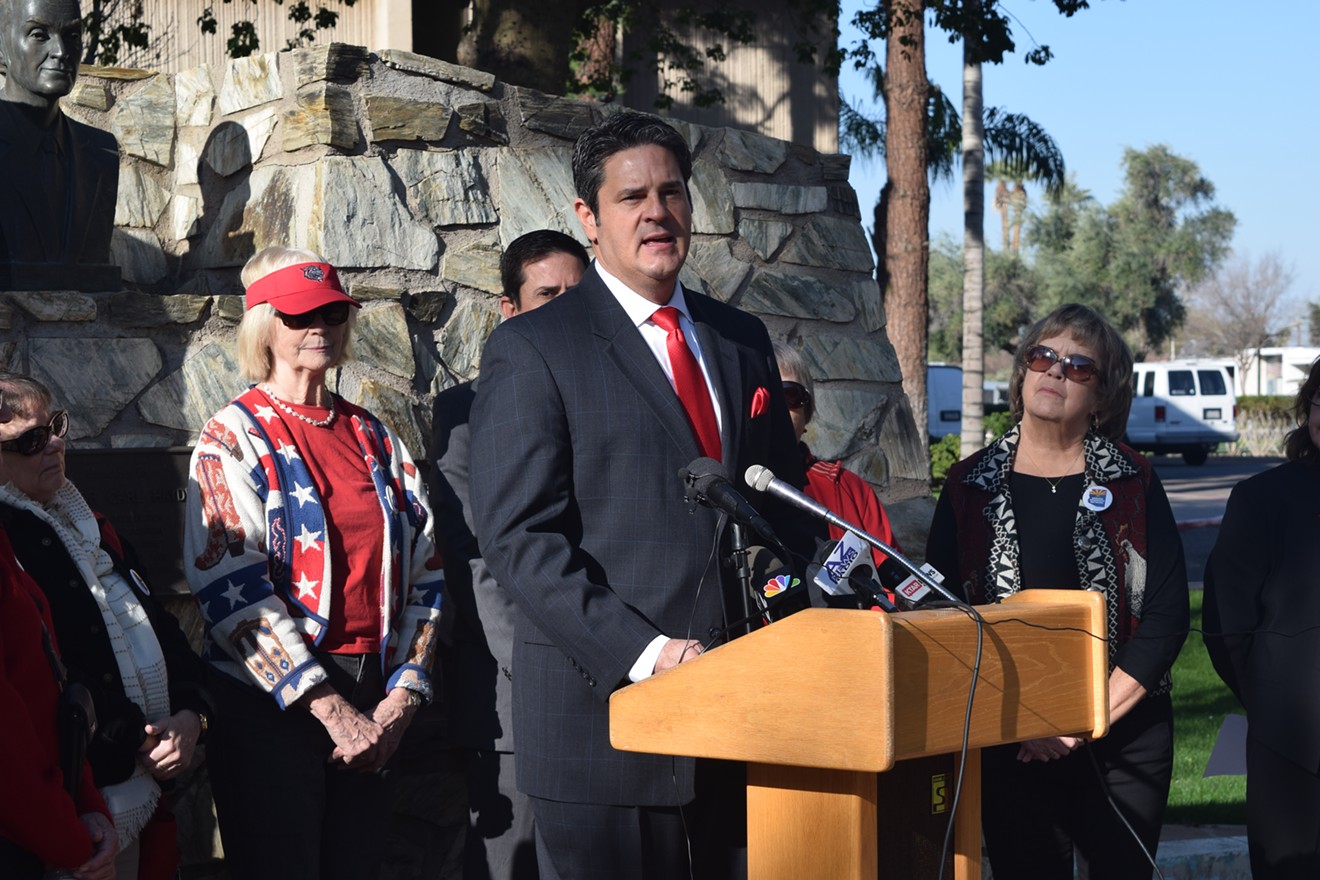Joe Thomas, the president of the Arizona Education Association, said at a Capitol press conference Friday that lawmakers must raise new revenue for schools during the legislative session that starts on Monday.
"Our students and our schools need funding now. We cannot wait and kick the can down the road once again," Thomas said.
Supporters of a new education tax raised enough signatures to put the Invest in Education Act on November's ballot last year, hoping to raise the rates on people who earned $250,000 or more — but voters never got the chance to decide the proposal's fate. In a split decision over the summer, the Arizona Supreme Court ordered the measure removed, citing a description of the initiative that could confuse petition-signers about the scope of the tax hike.
Thomas described the recent election as a mandate to fund schools, given that virtually every legislator, not to mention the governor, ran for office saying they would support students, teachers, and schools. Educators are prepared to hold them accountable, Thomas said.
He added that polling shows the Invest in Ed plan is popular, and thousands of educators are ready to collect signatures again. Last time, they gathered 270,000.
"That is our option on the table, but we want to work with the governor and the Legislature to bring funding to our schools now," Thomas said.
Thomas suggested he doesn't want to see the kind of massive #RedForEd teacher mobilization that took place last year, but said he is convinced it can happen again.
At the press conference, Thomas, along with Children's Action Alliance President and CEO Dana Wolfe Naimark, outlined their education-funding goals for the new session ahead of the opening of the 54th Legislature.
In a response to the groundswell of teacher protests that culminated in the weeklong teachers' strike in April, Governor Doug Ducey announced a teacher pay raise plan to give teachers a 20 percent raise by the 2020 school year. However, at the time, many educators said that Ducey's plan fell short and relied too much on a rosy, short-term economic outlook to account for the planned raises, as opposed to a sustainable source of revenue.
On Friday, advocates reiterated that any revenue for the education budget during the new session must come from sustainable sources that will shrink the roughly $1 billion gap in Arizona's education budget, which is the result of deep cuts that have never been fully restored following the 2008 recession.
"We saw a down payment from the governor and the Legislature, but remember, we have dug ourselves a very deep hole over the past 20 years, with disinvestments year after year after year in early education, K-12 education, and higher education," Wolfe Naimark said.
She praised the Legislature's passing of the governor's pay raise plan, but said the Legislature needs to do more to address an ongoing teacher shortage.
"We've taken some steps together, but now we need bold action. We need bigger action. And we need a long-term plan," Wolfe Naimark said.
In perhaps another sign of the power of the game-changing #RedForEd wave last spring, a school-funding proposal based on a tax hike has arrived before the session has even begun. And it's from a Republican legislator, Senator Sylvia Allen of Snowflake, the chair of the Education Committee.
As a January 11 Arizona Capitol Times article noted, the proposal represents quite a change of heart for Allen. In 2017, she opined in an op-ed for the Arizona Republic, "When is it ever enough?"

Rebecca Garelli, one of the #RedForEd leaders, poses with boxes of signatures for the "Invest in Education Act" in July. The Arizona Supreme Court later kicked the measure off the ballot.
Joseph Flaherty
Allen has proposed increasing Arizona's Proposition 301 sales tax, which funds a broad range of state education spending from 0.6 cents to a penny, with the condition that the Legislature would have voters approve the tax increase during the 2020 election. Allen's proposal is estimated to raise approximately $400 million in new revenue annually.
Approved in 2000, Proposition 301 was poised to expire until lawmakers voted to extend the tax for another two decades during the last legislative session. About $667 million annually from the current sales tax goes to K-12 education, as well as the public universities and community colleges.
But after Friday's press conference, an ally in the Invest in Ed fight sounded lukewarm on Allen's brainchild.
David Lujan, the director of the liberal Arizona Center for Economic Progress and an author of the doomed ballot measure, later told Phoenix New Times that his organization has a problem with a sales tax because it disproportionately affects the poor.
Moreover, the sales tax is somewhat inadequate, Lujan said, because fixing the billion-dollar deficit will realistically require more than one revenue stream.
"It's good that we have conservative, rural Republicans introducing education funding before the session. I mean, that's progress. But when you talk about raising a billion dollars in new funding, it's short," Lujan said. "It really only raises less than $400 million for new schools, and we have a problem with the regressiveness of a sales tax."
When asked whether the AEA prefers an Invest in Ed-style tax increase over Allen's sales-tax increase, Thomas said that he is "fairly agnostic when it comes to revenue streams," but he criticized Allen's proposal for not taking effect rapidly enough.
Last year, it took tens of thousands of educators just to move the needle a little bit with the governor's 20 percent raise, Thomas said.
"That's what makes me frustrated about what Senator Allen has proposed ... what she has put out is going to impact schools in '21-22. That's three years away. Our students cannot wait that long," Thomas said.
Yet in a sign of the contentiousness of a tax increase among Republicans, on Friday, Ducey came out against Allen's proposal. Following a luncheon sponsored by the Arizona Chamber of Commerce, the governor told reporters, “We don’t need a tax increase. We’ve got available dollars right now." There will be "a nice, healthy, hearty debate" about how to use those dollars, Ducey said, according to the Arizona Mirror.
Another practical challenge for education advocates who want to see more funding is the voter-approved requirement that any tax increase in the Legislature has to be approved by a two-thirds majority.
Despite the call for legislators to act before the 2020 election, Lujan acknowledged that the two-thirds majority is an obstacle, although he pointed out that the House is closely divided this year.
"You probably have to go to the ballot, but we haven't seen 31-29 in the House in four decades, so who knows? Maybe they can put something together," Lujan said. "But if they don't, if they don't refer something to the ballot, then we're prepared to go back and collect signatures and do it ourselves."
(This article has been updated with comments from Governor Doug Ducey on Senator Sylvia Allen's proposal.)












